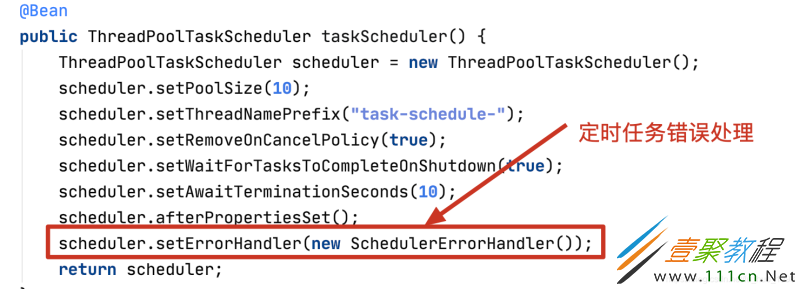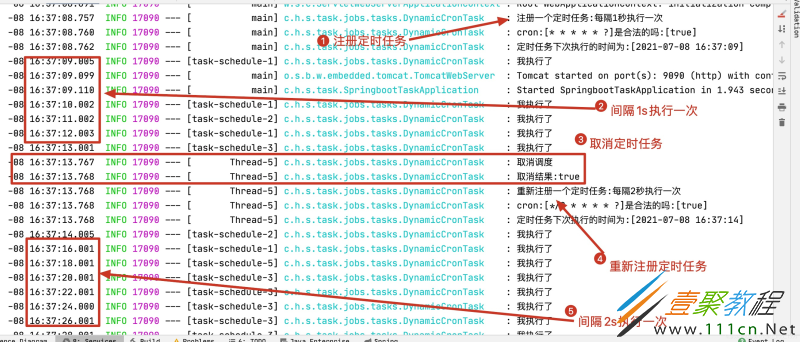Spring动态添加定时任务代码实现示例
作者:袖梨
2022-06-29
本篇文章小编给大家分享一下Spring动态添加定时任务代码实现示例,文章代码介绍的很详细,小编觉得挺不错的,现在分享给大家供大家参考,有需要的小伙伴们可以来看看。
一、背景
在工作中,有些时候我们有些定时任务的执行可能是需要动态修改的,比如:生成报表,有些项目配置每天的8点生成,有些项目配置每天的10点生成,像这种动态的任务执行时间,在不考虑分布式执行的情况下,我们可以 使用Spring Task来简单的实现。
二、需求和实现思路
1、能够动态的添加一个定时任务。
在Spring中存在一个类ThreadPoolTaskScheduler,它可以实现根据一个cron表达式来调度一个任务,并返回一个ScheduledFuture对象。
2、能够取消定时任务的执行。
通过调用上一步的ScheduledFuture的cancel方法,就可以将这个任务取消。
3、动态的修改任务执行的时间。
先取消任务。然后在重新注册一个任务。
4、获取定时任务执行的异常
ThreadPoolTaskScheduler类中有一个设置ErrorHandler的方法,给自己实现的ErrorHandler即可。
提示:
在Spring中我们通过@Scheduled注解来实现的定时任务,底层也是通过ThreadPoolTaskScheduler来实现的。可以通过ScheduledAnnotationBeanPostProcessor类来查看。
ThreadPoolTaskScheduler的默认线程数是1,这个需要根据实际的情况进行修改。
三、代码实现
此处只给出动态注册定时任务和取消的定时任务的代码。
package com.huan.study.task.jobs.tasks;
import lombok.extern.slf4j.Slf4j;
import org.springframework.beans.factory.InitializingBean;
import org.springframework.beans.factory.annotation.Autowired;
import org.springframework.scheduling.concurrent.ThreadPoolTaskScheduler;
import org.springframework.scheduling.support.CronExpression;
import org.springframework.scheduling.support.CronTrigger;
import org.springframework.stereotype.Component;
import java.time.LocalDateTime;
import java.time.format.DateTimeFormatter;
import java.util.concurrent.ScheduledFuture;
import java.util.concurrent.TimeUnit;
/**
* @author huan.fu 2021/7/8 - 下午2:46
*/
@Component
@Slf4j
public class DynamicCronTask implements InitializingBean {
@Autowired
private ThreadPoolTaskScheduler taskScheduler;
private ScheduledFuture scheduledFuture;
@Override
public void afterPropertiesSet() throws Exception {
// 动态启动一个定时任务
log.info("注册一个定时任务:每隔1秒执行一次");
scheduledFuture = register("* * * * * ?");
// 取消一个调度
new Thread(() -> {
try {
TimeUnit.SECONDS.sleep(5);
log.info("取消调度");
scheduledFuture.cancel(false);
log.info("取消结果:" + scheduledFuture.isCancelled());
log.info("重新注册一个定时任务:每隔2秒执行一次");
register("*/2 * * * * ?");
} catch (InterruptedException e) {
e.printStackTrace();
}
}).start();
}
private ScheduledFuture register(String cron) {
// 高版本使用 CronExpression,低版本使用 CronSequenceGenerator
boolean validExpression = CronExpression.isValidExpression(cron);
log.info("cron:[{}]是合法的吗:[{}]", cron, validExpression);
CronExpression expression = CronExpression.parse(cron);
LocalDateTime nextExecTime = expression.next(LocalDateTime.now());
if (null != nextExecTime) {
log.info("定时任务下次执行的时间为:[{}]", nextExecTime.format(DateTimeFormatter.ofPattern("yyyy-MM-dd HH:mm:ss")));
}
return taskScheduler.schedule(new Runnable() {
@Override
public void run() {
log.info("我执行了");
}
}, new CronTrigger(cron));
}
}
四、


















